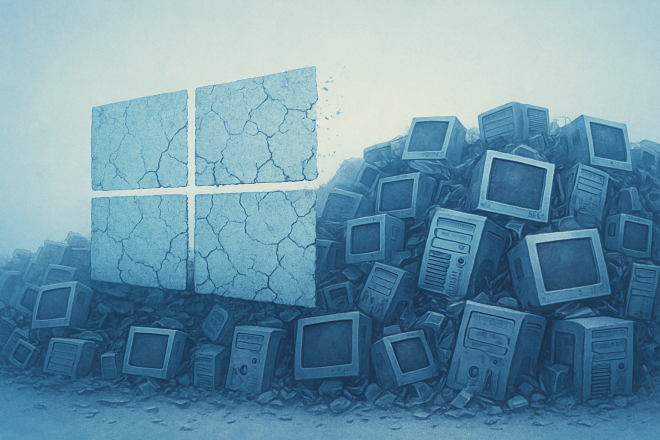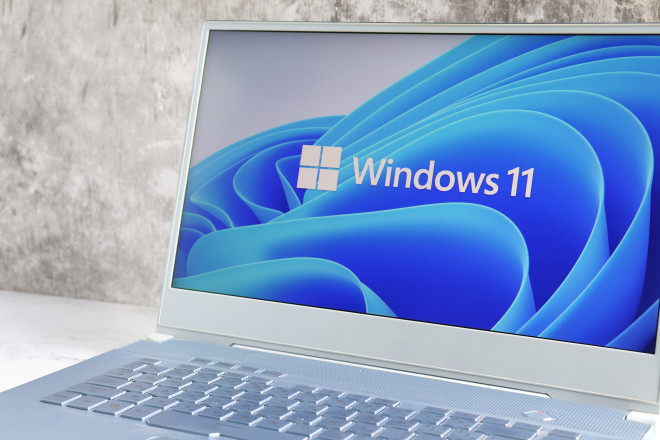The end of Windows 10
It’s standard practice for Microsoft to phase out its operating systems after 10 years. There have always been complaints, but this time I expect nothing less than a storm of outrage. Because 2025 changes everything: Many computers that still run Windows 10 perfectly well are, according to Microsoft, not compatible with Windows 11. And we’re not talking about outdated junkers wheezing through boot-up with noisy fans—we’re talking about powerful machines. At the same time, Windows 11 is far from dominating the market—roughly 30% use it, while nearly two-thirds are still on Windows 10. Windows 11’s new security concept will separate the wheat from the chaff—and there's no solution in sight!

A special case
New operating systems have always been a challenge for people and machines alike, often coming with some drawbacks. Vista, for example, overwhelmed many systems with its performance demands. Still, this time, it’s a different kind of problem. It’s not system performance, but security features of built-in hardware that tip the scale. In the past, it felt natural to retire aging devices and see a new version of Windows as a welcome excuse to upgrade. But this time, many PCs that are still considered powerful by today’s standards aren’t eligible for Windows 11. In recent years, major performance jumps in PC hardware have become rare, so devices stay relevant longer. The result: Many machines run Windows 10 smoothly and could easily handle Windows 11—just not officially.
What happens in October?
Of course, Windows 10 won’t vanish in a puff of smoke when support ends—it’ll still run just like before, while current browsers and antivirus software will continue to help fend off many threats. But the real issue goes deeper: Never before have hackers had such a massive and tempting target. Critical security vulnerabilities will likely become as valuable as gold—and cybercriminals are surely already preparing for a hot fall. I wrote about zero-day exploits seven years ago—they are “a vulnerability or security hole in a computer system unknown to its owners, developers or anyone capable of mitigating it”—and there's lively underground trade around them. There are likely still many in Windows 10, but in this case, Microsoft won’t be patching those holes anymore. So processing any personal data with these systems is becoming increasingly risky.
Sustainability? Tough call.
These days, every company tries to show its green credentials, often with a symbolic daisy pinned to its logo. Microsoft even publishes a detailed sustainability report, proudly celebrating its environmental wins. Yet an estimated 2.17 billion PCs (!) still run Windows 10, and many of them won’t upgrade to Windows 11. We’re talking about a gigantic amount of perfectly functional hardware slowly drifting toward e-waste—unthinkable! Refurbished PC dealers already report full warehouses with unsellable machines. People just want future-proof devices.
 Demanding system requirements for upgraders
Demanding system requirements for upgraders
High performance, headed for Retirement
Even my personal collection of computers is affected. As a tech editor, I need to work on the latest OS—I have to stay on the cutting edge. When I found out that my work laptop wasn’t Windows 11-compatible, I bought it myself and kept it as a backup or travel machine. With a 7th-gen i7 quad-core CPU, 16 GB RAM, and a NVIDIA 1060 GPU, it was way too good to be shelved. I was hoping Microsoft would come up with a user-friendly workaround—but so far (as of now), no luck. My wife’s laptop, from the same generation and much more modest in specs, was surprisingly deemed worthy and now remains her main device for browsing and office work.
My personal take
I still can’t quite believe that Microsoft would coldly force millions of customers to choose between buying a new PC or continuing to work with an increasingly vulnerable system–or switching to a different OS that definitely isn’t Windows. If I proposed something like that to my bosses, I’d probably end up with a lot more free time. But Microsoft hasn’t budged. The current Windows 11 system requirements are said to be essential for Windows 11’s security model. To keep billions of PCs supported, Microsoft would have to rewrite key parts of Windows 11—or release a sort of light version. This doesn’t just affect Windows users, but also those using MS Office, Azure, or Edge—customers Microsoft obviously wants to keep. It’ll be interesting to see what the Redmond giant comes up with in the coming months. I expect mounting pressure—from users (remember Windows XP?), environmental groups, even politicians. Maybe Microsoft wants to take a hardline approach here—as a clean break and tech reboot! I’ll personally stick with Windows as my main OS, but I’ll install a cozy little Linux distro on that one affected machine. I haven’t decided which one yet—maybe I’ll even blog about it!
A little service for you
Here is a compatibility check for Windows 11 for you.To answer all your questions about this complex topic, we’ve put together a dedicated page you can find here. All facts should be up to date, though things might still change before October—and honestly, I’m hoping they will!




